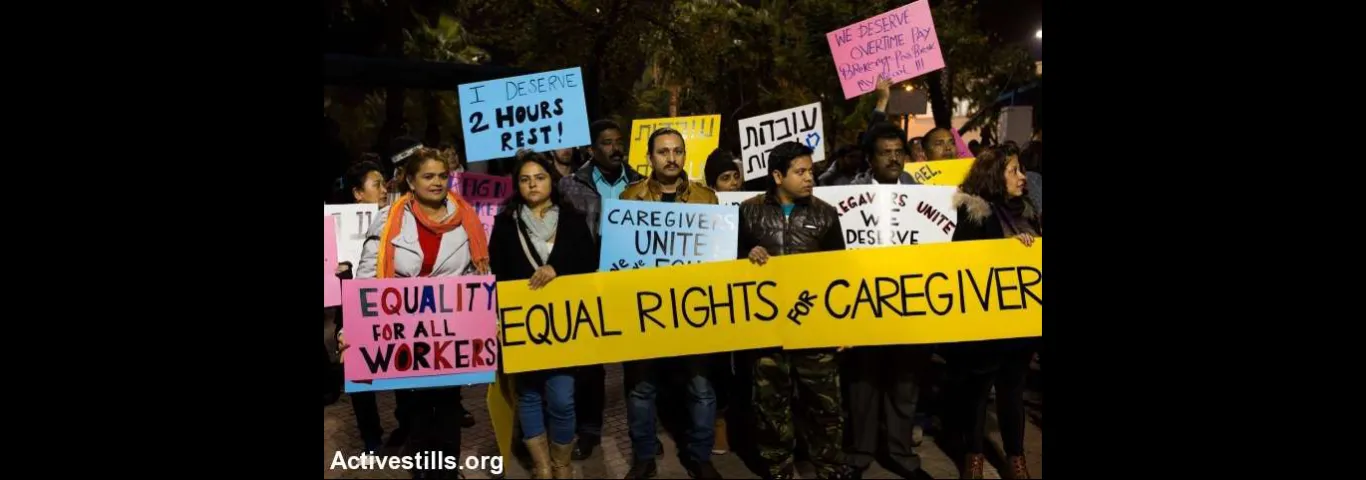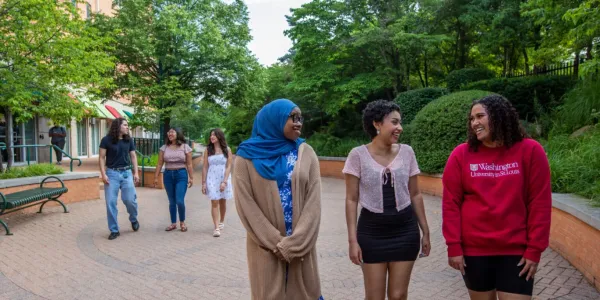Interview with Faculty Fellow Rachel Brown
Hundreds of thousands of migrant workers are employed as caregivers in Palestine/Israel, nurturing the bodies of elderly and disabled Jewish-Israelis and sustaining the body politic of the State of Israel. Recruited from South and Southeast Asia and Eastern Europe, these women sacrifice personal freedoms — and take on large debts — for the opportunity to earn a better living. Through ethnographic interviews with migrant caregivers and their employers, Faculty Fellow Rachel Brown, assistant professor of women, gender and sexuality studies, focuses on this often-overlooked population in her book project, “Four Years, Three Months: Migrant Caregivers in Palestine/Israel.”
Who are these caregivers, and why is there a need for them?
Migrant caregivers in Palestine/Israel come from the Philippines, Nepal, Sri Lanka, and India, and in smaller numbers, from Moldova, Bulgaria, Romania, and Hungary. The government began granting visas to migrant workers in construction and agriculture following the first intifada — the Palestinian popular uprising — adopting policies of economic separation and securitization of Palestinians. Workers from Thailand and China, among other countries, thus began replacing Palestinians in these industries. Though migrant caregivers had come in small numbers since 1988, following passage of the Long Term Care Insurance Law, this post-intifada moment paved the way for migrant caregivers in much greater numbers. The Long Term Care Insurance Law was a response to the growing number of elderly and frail adults within the population, and eventually, an effect of neoliberal privatization and the retrenchment of state welfare services. The presence of migrant caregivers is thus a combination of neoliberal spending cuts, as well as shifts in the racialization of labor.
The official number of migrant caregivers is roughly 60,000. However, this figure does not include the large number of undocumented workers, whose legal status often changes in response to restrictive employment, migration and citizenship laws. One worker organizer said there are as many as 100,000 migrant caregivers in the Filipinx community alone. I have also heard 300,000 as a total number, inclusive of undocumented workers.
In a literal sense, the largest business aspect of this is the for-profit recruitment and placement agencies that charge thousands of dollars in illegal fees to workers who wish to migrate. Migrant caregivers pay on average between USD $7,000 and $15,000 to migrate, often selling their property and possessions to finance the cost. They are thus paying loans for up to the first two years of their time in Palestine/Israel, and are unable to remit money home until after this point. This debt shapes their bargaining power, their ability to hold abusive employers accountable and their legal status. Overall the government has taken a very hands-off approach to regulating these agencies. Further, ambiguities in employment law diminish the ability of workers and activists to hold abusive employers or agencies accountable.

The title of your project, “Four Years, Three Months,” refers to the length of time these migrant caregivers’ visas allow. Why is the time limit important?
This is the length (at the time of research) of the visa for migrant caregivers. In the Israeli context, migrant caregivers’ legal status is bound to their employment status, effectively hindering their ability to leave employers, even under abusive circumstances. This weak bargaining power is exacerbated by the importance of the monthly salary for paying off the high-interest loans required to migrate (though the official “binding arrangement” legally tying migrant caregivers to employers was ruled unconstitutional in 2006, subsequent amendments have held many of the worst effects of this protocol in place).
When a migrant caregiver’s visa expires, they become undocumented. There are two main exceptions to this rule. One is if they are still caring for an elderly or disabled charge at the time of expiration, at which point they can stay until the employer dies. The other exception is if they receive a “special visa” to stay longer, which is increasingly rarely granted. Thus, a worker’s economic situation and legal status is predicated upon the bodily health and approval of the employer. This profoundly shapes the relationship, from the “asks” a worker can make of their employer, to their ability to contest exploitation and refuse work beyond the contract, to their capacity to mitigate indebtedness and demand that an employer honor their rights. It impacts the ways they must strategically navigate the complex emotional dynamics of the relationship, and the extent to which they can take breaks from the strenuous physical work of caregiving.
Workers’ ways of strategically navigating the employer/caregiver relationship and their ability to collectively organize are thus deeply shaped by the visa limit, which ties their precarity to the employer’s bodily health, and to broader discourses about who is deserving of care under neoliberal capitalism. These neoliberal discourses about who is worthy of care take particular iterations in Palestine/Israel in ways that invoke and are always already in relation to the treatment of Palestinians.
How do the caregivers think and feel about their situation within Israeli society?
Workers spoke about a range of feelings about their employment situations and their time in Palestine/Israel, all of which are comparative and contextual. On the one hand, the caregiver/employer relationship is one of exploitation and immense inequality, by legal and economic design. Workers who have yet to pay off high interest loans to middleman agencies cannot start remitting money home until sometimes two years into their stay, meaning that they are only making money for two years and three months. Migrant caregivers, unlike workers in all other labor sectors, are also excluded from overtime pay, exacerbating the extraction of their labor. Though they technically have 26 hours off a week, many often don’t see this time, and are denied their rest hours or vacation days.
Given this context, workers characterize this contradictory employer/caregiver relationship as one of love, mistrust, trust, exploitation, closeness, racism, familial affection, intimacy, care, dependency, surveillance and alienation. Many express deep love and affection for their charges, even as they deal with the pain of long-term separation from their own families and regularly contest employer exploitation.
One trope that commonly arises in Palestine/Israel is a sort of “development” trope instrumentalizing migrant caregivers as agents of economic development who contribute to their home countries by remitting money that helps alleviate poverty. In addition to instrumentalizing workers, this trope treats migrant caregivers as human capital, decontextualizing and flattening the many reasons they migrate, and the rootedness of transnational labor migration in neoliberal global restructuring (structural adjustment policies, conditional aid, state retrenchment from welfare, etc.) and colonial labor extraction. This economic and historical context underlies these relationships, which are themselves effects of these transnational (racialized, sexualized, gendered) labor formations.
What observations have you made about Israeli citizenship by looking into their relationships with this group of noncitizens?
Much of the relationship is shaped by the Law of Return, which prioritizes Jewish immigration to Palestine/Israel, while excluding Palestinians and non-Jewish migrants from this same right. Though Israel has no constitution, its subsequent Basic Laws, as well as the most recent Nation-State law, create a racial/ethnic citizenship regime based largely upon jus sanguinis, or the law of blood. Citizenship is thus inaccessible to migrant caregivers (and non-Jewish migrants more broadly, except under exceptional circumstances), rendering migrant caregivers permanently temporary.

Migrant workers are not allowed to marry, and if they have children, they must send them abroad within three months or leave the country with them (though this was ruled unconstitutional in 2011, it effectively still applies through different formal and informal mechanisms). These laws also have profound implications for Eritrean and Sudanese asylum seekers, and migrant workers in the agricultural and construction industries. The particular context of migrant carework in Palestine/Israel suggests that feminist approaches to rethinking reproductive, care and domestic labor need be understood within the context of nation-building, to ask what role this labor plays in discourses of exclusionary nationalism, displacement and in generating wealth for the state.
This citizenship regime impacts migrant caregivers’ ability to collectively organize (during waves of deportation in 2002, several migrant community leaders were deported, and those who attempted to organize workers were targeted more broadly), requiring instead individualized forms of risk mitigation within the home. Whereas in other professions, workers can sometimes organize at the “point of production” — for example, on the factory floor — or make demands of a shared boss, workers in the care/domestic sector cannot do the same. Lack of citizenship and social rights, and the surveillance of sexual and reproductive practices exacerbate this situation. Migrant caregivers’ exclusion from overtime pay further contributes to the challenges of organizing in a collective, public way. Despite these barriers, migrant workers take part in vast communal service provision and mutual aid networks through both formal and informal migrant organizations.





